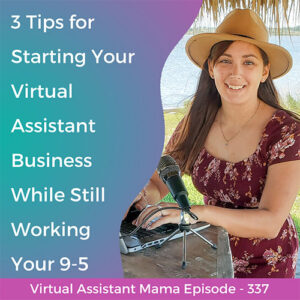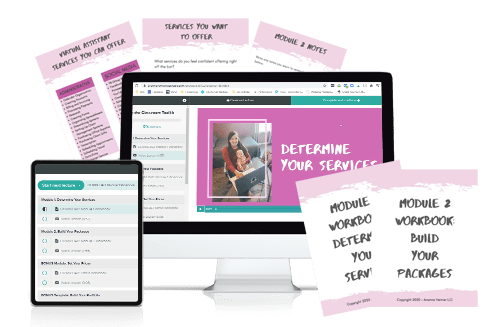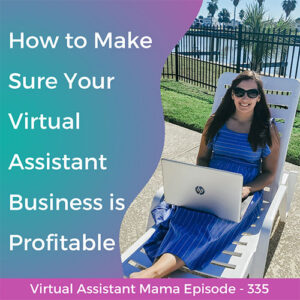
Episode 337: 3 Tips for Starting Your Virtual Assistant Business While Still Working Your 9-5
In this episode of the Virtual Assistant Mama podcast, I’m sharing 3 tips to help you start your Virtual Assistant business while still working your 9-5.
As you’re working toward leaving teaching and pursuing God’s calling on your life, you’re going to face some roadblocks. Some of these will be external, coming from those around you. Some will be internal, coming from the place inside of you that wants things to stay the way that they are, to stay safe in the security of what you know.
That’s why, in today’s episode of the Ditch the Classroom podcast, I’m breaking down the 4 most common roadblocks you’ll face and how you can overcome them.
AND, don’t forget to grab your copy of “Teacher Turned…” in order to be entered into our 5-DAY LONG GIVEAWAY which will is taking place this week, February 20-24, over in our free Facebook community! Head on over to teacherturnedfreelancer.com/book to grab your copy!


Grab your Ditch the Classroom Toolkit for only $47!
Sign up for the free Virtual Assistant Workshop, the Ditch the Classroom Toolkit, or Teacher Turned Freelancer Academy.
Have any questions for me? Feel free to send me an email at arianna@ariannavernier.com or on Instagram @arianna.vernier! I love chatting with y’all and helping you hit the ground running. Are you ready? Let’s go.
Love,

Full Episode Transcription:
(00:07):
If you have not already heard, the Teacher Turned … book is officially live and out there in the world. You can grab your copy over at teacherturnedfreelancer.com/book and make sure to do so so you can get entered into our five day giveaway that is still going on through tomorrow, February 24th, over in our free Facebook community. You can join that community if you’re not already in there at facebook.com/groups/ditchtheclassroom. Now y’all, I want you to understand that as you are working towards leaving teaching and pursuing God’s calling on your life, you’re going to face some roadblocks. Some of these are gonna be external coming from those around you, and some are gonna be internal coming from the place inside of you that once things stay the way that they are in order to say safe and security of what you know. Before we dive into the four main challenges that you may face, I want you to take a moment and shift your mindset about them. So instead of seeing these obstacles as hindering your journey, I want you to see them for what they are. They are challenges that can be overcome when God is by your side. Maybe he’s put this roadblock in front of you as a test of your faith. Maybe he wants to see if you trust him enough to turn to him when you’re struggling, whatever the case, if we can reframe our mindset around these inevitable hiccups, we stand a much better chance of overcoming them.
(02:58):
So let’s just go ahead and dive into these different roadblocks. Roadblock number one is guilt. So many of the teachers that I talk to who wanna quit teaching battle major guilt about letting their families down or “wasting their teaching degree”, you guys, I totally understand this because I felt the same way as far as guilt about letting your family down. I know that you don’t want to let others down, especially those who may have helped you get your teaching degree in the first place. But I want you to understand one key thing. Other people’s expectations are not your responsibility. We cannot live our lives constantly trying to seek the validation and approval of others. It’ll never happen, and it’s quite frankly just too exhausting to even try. If someone close to you is expressing concern about your choice to pursue a new purpose outside of the classroom, they’re most likely only saying these things to you for one of three reasons.
(04:01):
One, their own fears. People often push their fears onto others. They’re probably not even aware that they’re doing it. Remember that this is a battle that they are facing internally and you don’t need to take it on as well. Two is their own unhappiness. Do you remember the age old saying where a person who’s drowning will try to take someone down with them? People want to feel like they have others with them in the struggle. They don’t wanna feel like they’re being left behind to deal with their unhappiness themselves. Again, they might not realize that they’re doing it, but those that you love might be expressing concerns about you quitting teaching simply because they’re also unhappy with where they’re at, but they’re too afraid to do anything about it. Number three is fear for your safety. Let’s face it, the people in our lives who matter the most to us want to know that we are safe and cared for when we step in a new territory and out of the identity in which they’ve known us.
(04:59):
That can trigger the need for people to feel like they have to protect us. So what can you say to those that you love if they cause you to feel guilty about your choice to leave teaching? My favorite response is, thank you for your concern, but this is my life and this dream has been given to me for a reason. I don’t wanna regret not following it with this response. You’ve shown them that you see where they’re coming from, but you’ve also firmly stated that this is your journey and not theirs, and I also want you to remember that you do not need anyone’s permission to pursue your God-given purpose outside of teaching. Now, real quick, let’s address guilt around not using your teaching degree anymore. So many of the teachers I talk to feel guilty about leaving the students behind, and this is another form of guilt that I completely understand.
(05:54):
Again, we need to reframe our mind about it. What if you are still able to change the lives of kids, but just in a different capacity? What if instead of only impacting the lives of 30 students a year, you were able to reach hundreds through whatever calling God had placed on your heart? What if you’re meant to use that teaching degree to help others learn a crucial skill that would allow them to go out and impact hundreds more? We don’t have to stick ourselves in a box called the classroom. We can use our teaching degrees in so many different ways and still make the world a better place while we’re doing so. Okay, so roadblock number one was guilt. Roadblock number two is imposter syndrome. You guys, everybody deals with imposter syndrome, but not many people know that it actually has a name. A lot of people don’t even recognize that the fears they’re struggling with are just imposter syndrome rearing its ugly head.
(06:52):
Before we jump into how to overcome imposter syndrome, let’s define it according to Google. Imposter syndrome is a psychological pattern in which an individual doubts their skills, talents, or accomplishments, and has a persistent internalized fear of being exposed as a fraud. So essentially, imposter syndrome makes you feel like you’re a fake. It might make you wonder, who am I to do this? Or why is someone paying me for this when the person over there has so much more experience? 75% of people are said to experience imposter syndrome, even executives, CEOs and celebrities. I’m also willing to bet that the 25% who say they don’t experience imposter syndrome simply don’t know how to identify their feelings. Okay? It is a constant battle for so many, but it’s another one that can be overcome if you have the right tools in your pocket. So tool number one is positive affirmations.
(07:52):
These are simple statements that can help you reframe your beliefs about what you can do. So these affirmations should be statements that you believe about yourself already or that you believe could happen. So some examples are, I’m caring towards others. I have a great attention to detail. People’s lives are changed when they work with me. Now, I recommend writing your affirmations on a piece of paper that you can reference whenever you’re doubting yourself. This will help you flip the switch from, I have no idea what I’m doing. Why did I quit teaching to do this? To, okay, I’m struggling with feeling like a fraud, but even though I may not know how to do this thing, I know that I’m really good at these other things and I know that with time I can practice and figure out this thing I’m not yet feeling confident in.
(08:42):
All right. Second combat strategy for imposter syndrome is to create a feel-good folder. This is a great way to battle thoughts of doubt and fear, and I recommend creating a folder in your phone with screenshots of positive emails, texts, comments, and even projects that you feel like you did a good job on. You probably have your phone on you most of the time, so this is a really quick way to be able to read through things that make you feel more confident. Similar to positive affirmations, you’re just reminding yourself, I have the ability to figure things out. Maybe I didn’t know how to do this before, but now this person is telling me they love what I did for them and I was able to figure it out. Okay. Strategy number three for overcoming imposter syndrome is to practice, practice, practice. It might be a cliché to say, but practice makes perfect.
(09:36):
If someone wants to pay you to do something for them, try doing it for yourself first. YouTube and Google are your best friends. Nobody has to know that a project you created was for a fictitious client or job. They just want to know that you can do it, period. So start practicing before anyone even hires you, and you’re gonna build that confidence to go for it when they do. Sister, I wanna tell you, you have the ability to figure things out. You don’t have to sit in fear of the unknown, and you don’t have to struggle with feeling like a fraud when you face these thoughts, and you will, I want you to say this to yourself. The fears in my head are not true. They’re just a prison that I’ve placed myself in. I can choose to believe something different each day. All right, so roadblock number one was guilt roadblock.
(10:27):
Number two was imposter syndrome roadblock. Number three is perfectionism. One of the biggest struggles I see so many teachers face is that they feel like they have to do things perfectly. Let me say this upfront, done is better than perfect. You can always improve anything you’re working on. So if you’re not taking action because you think whatever you’re doing has to be perfect, it’s never gonna happen. When I’m battling perfection, I like to ask myself, what would happen if I didn’t put this out into the world? What if God meant for this to change someone’s life, but I sat on it? Instead? You’re not always gonna know that whatever you’re putting out in the world is what the world actually wants. But remember, you can always tweak things as you go. Instead, choose to take that step of faith and do whatever it is that God is calling you to do, even if it’s not 100% perfect.
(11:27):
All right, roadblock number four is distractions. Sometimes we know God is calling us, yet we’re afraid to answer. We wonder if we’re hearing God right and whether he’s really choosing us. We wonder if now is the right time or if we should just wait a little longer. So instead we distract ourselves with things that we think are important or give excuses about why we can’t answer God’s call right away. When we don’t take immediate action on God’s calling, we’re missing out on his blessings and protections. Sometimes our call from God feels uncomfortable. The timing feels off, or it feels inconvenient, but this is how obedience is tested. As chosen daughters of the King, we need to make sure that our priorities are in check and that we have a willing spirit instead of waiting on the right time or continuing to delay answering God’s call, we’re directed in scripture to take immediate action.
(12:26):
In Matthew 4:18, when Jesus asked Simon Peter to join him, Simon Peter immediately got out of his fishing boat and began to follow Christ. He didn’t know the outcome. He didn’t know how. He only knew that God told him to come. We have to put aside our fears, worries, and excuses. Instead, we need to follow God’s lead so that we can bring glory to him. When you take immediate action on God’s calling, it will bring you favor, blessing, and most importantly, closeness to God. God promises that his children will be blessed as well as their children and their children’s children. When you walk in obedience and answer God’s calling, you’ll reap heavenly rewards and change the path of your life. So I just want you to remember that God gave you the dream that has been placed on your heart for a reason. You can either let him tap you with a feather and obey immediately, or he can hit you over the head with a large book because you’re not listening.
(13:31):
Which one would you prefer? You guys, I just pray that you open your heart to answer God’s call and know that He’s with you, encouraging you, blessing you, and protecting you on your journey. I know that walking out God’s plans for you will be the greatest honor of your life. I pray that He helps you overcome any obstacles that are placed in your path so that you can go where he is calling you. All right, y’all. I hope that this episode spoke to you. If it did, you’re going to love, love, love, Teacher Turned … So go grab your copy over at teacherturnedfreelancer.com/book and make sure you join us next week. We have a fun, new, incredible series starting next Monday, February 27th. Yes, I said Monday. Usually our episodes are Tuesday and Thursday, but come back Monday to hear all about what I’ve got happening for you. It is gonna be so fun and help you guys so much, so I can’t wait. All right, y’all. I love you so much, and we will see you Monday.

In this episode of the Virtual Assistant Mama podcast, I’m sharing 3 tips to help you start your Virtual Assistant business while still working your 9-5.

In this episode of the Virtual Assistant Mama podcast, I’m sharing how to balance your business and family life as a Virtual Assistant.

In this episode of the Virtual Assistant Mama podcast, I’m sharing how to make sure your Virtual Assistant business is profitable.